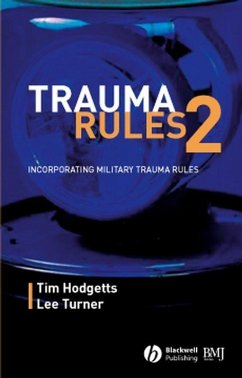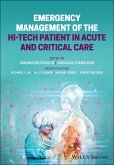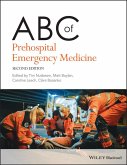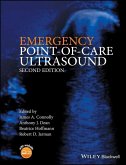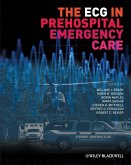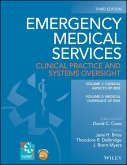

Alle Infos zum eBook verschenken

- Format: ePub
- Merkliste
- Auf die Merkliste
- Bewerten Bewerten
- Teilen
- Produkt teilen
- Produkterinnerung
- Produkterinnerung

Hier können Sie sich einloggen

Bitte loggen Sie sich zunächst in Ihr Kundenkonto ein oder registrieren Sie sich bei bücher.de, um das eBook-Abo tolino select nutzen zu können.
Trauma Rules 2 retains its lively and fun presentation to help you remember the essential principles of trauma care and feel confident about handling and treating patients appropriately in the first hours of injury. Thoroughly expanded and updated, and now including military trauma rules, the second edition of this popular pocket book now offers: * 70 easy-to-memorize rules covering the important aspects of trauma care * clear, authoritative explanations and instructive illustrations * the three principal stages of trauma management: approach to the patient, initial assessment and…mehr
- Geräte: eReader
- mit Kopierschutz
- eBook Hilfe
- Größe: 4.94MB
![Emergency Management of the Hi-Tech Patient in Acute and Critical Care (eBook, ePUB) Emergency Management of the Hi-Tech Patient in Acute and Critical Care (eBook, ePUB)]() Emergency Management of the Hi-Tech Patient in Acute and Critical Care (eBook, ePUB)84,99 €
Emergency Management of the Hi-Tech Patient in Acute and Critical Care (eBook, ePUB)84,99 €![ABC of Prehospital Emergency Medicine (eBook, ePUB) ABC of Prehospital Emergency Medicine (eBook, ePUB)]() ABC of Prehospital Emergency Medicine (eBook, ePUB)30,99 €
ABC of Prehospital Emergency Medicine (eBook, ePUB)30,99 €![Emergency Point-of-Care Ultrasound (eBook, ePUB) Emergency Point-of-Care Ultrasound (eBook, ePUB)]() Emergency Point-of-Care Ultrasound (eBook, ePUB)104,99 €
Emergency Point-of-Care Ultrasound (eBook, ePUB)104,99 €![The ECG in Prehospital Emergency Care (eBook, ePUB) The ECG in Prehospital Emergency Care (eBook, ePUB)]() The ECG in Prehospital Emergency Care (eBook, ePUB)32,99 €
The ECG in Prehospital Emergency Care (eBook, ePUB)32,99 €![Emergency Medical Services (eBook, ePUB) Emergency Medical Services (eBook, ePUB)]() Emergency Medical Services (eBook, ePUB)109,99 €
Emergency Medical Services (eBook, ePUB)109,99 €![Emergency Triage (eBook, ePUB) Emergency Triage (eBook, ePUB)]() Advanced Life Support Group (Alsg)Emergency Triage (eBook, ePUB)35,99 €
Advanced Life Support Group (Alsg)Emergency Triage (eBook, ePUB)35,99 €![Geriatric Emergencies (eBook, ePUB) Geriatric Emergencies (eBook, ePUB)]() Geriatric Emergencies (eBook, ePUB)97,99 €
Geriatric Emergencies (eBook, ePUB)97,99 €-
-
-
Dieser Download kann aus rechtlichen Gründen nur mit Rechnungsadresse in A, B, BG, CY, CZ, D, DK, EW, E, FIN, F, GR, HR, H, IRL, I, LT, L, LR, M, NL, PL, P, R, S, SLO, SK ausgeliefert werden.
- Produktdetails
- Verlag: Wiley-Scrivener
- Seitenzahl: 160
- Erscheinungstermin: 11. Oktober 2010
- Englisch
- ISBN-13: 9781444327243
- Artikelnr.: 38306750
- Verlag: Wiley-Scrivener
- Seitenzahl: 160
- Erscheinungstermin: 11. Oktober 2010
- Englisch
- ISBN-13: 9781444327243
- Artikelnr.: 38306750
- Herstellerkennzeichnung Die Herstellerinformationen sind derzeit nicht verfügbar.
1 Anxiety provokes memory loss: so learn a system and stick to it.
2 All 4 one and one for all.
3 Civilian and military trauma care is different.
Preparation.
4 Any time preparing is time well spent.
5 If in doubt, call the Trauma Team.
6 Save yourself before the casualty.
7 The Team Leader is always right.
Approach to the patient.
8 Assume the worst and proceed accordingly.
9 Read the wreckage.
10 Do a frisk or take a risk.
11 Don't let the obvious distract from the occult.
12 The Trauma Team can only look or listen, not both.
Initial assessment and resuscitation.
13 Tourniquets save lives.
14 If the bleeding is dramatic, use a novel haemostatic.
15 If you decide to crack the chest, survival's almost nil at best.
16 The airway is more important than the cervical spine.
17 When NEXUS guidelines clear the spine, the spinal board's a waste of
time.
18 All trauma patients are dying for oxygen.
19 It is not lack of intubation that kills, it is lack of oxygenation.
20 Do not delay with a burned airway.
21 Think of cricothyrotomy when all else fails.
22 Look at the neck TWELVE times in the primary survey.
23 A hard collar does not protect the cervical spine.
24 All Trauma surgeons Occasionally Miss Cervical Fractures.
25 When patients with facial injuries look up at heaven they will soon be
there.
26 Blood on the floor is lost forever more.
27 Short and thick does the trick.
28 Hidden blood loss will CRAMP your resuscitation.
29 Surgery does not follow resuscitation, it is part of resuscitation.
30 The stabbed stay stabbed until they reach theatre.
31 O Negative is good, but you can have too much of a good thing.
32 An injury above and below the abdomen implies an injury in the abdomen.
33 A penetrating wound below the nipple involves the abdomen.
34 Examination of the abdomen is as reliable as flipping a coin.
35 Neurogenic shock is hypovolaemic shock until proved otherwise.
36 Think of the causes of PEA or your patient is for THE CHOP.
37 Respiratory rate is the most sensitive indicator of deterioration, but
nurses record TP not TPR.
38 Head injury alone does not cause hypotension.
39 Resuscitate the mother and the baby will look after itself.
40 Children are not small adults.
41 Everyone is equal, but some are more equal than others.
42 Limb splintage is part of resuscitation.
43 The Glasgow Coma Scale does not measure prognosis.
44 A patient has a front, a back, two sides, a top and a bottom.
45 Put a finger in before putting a tube in.
46 The agitated patient will calm down while deteriorating.
47 You are not dead until you are death warmed up.
48 The golden rule is golden fluid in the golden hour.
49 It doesn't hurt to give analgesia.
Investigation and definitive care.
50 The golden hour belongs to the patient.
51 You can assess vision with the eyes closed.
52 You may read the newspaper, but you cannot read the DPL.
53 FAST procedure, quick decision.
54 A tension pneumothorax cannot be diagnosed on a chest X-ray.
55 A supine chest X-ray may be worse than no chest X-ray at all.
56 Investigation must never impede resuscitation.
57 Serial blood gases are the signposts on the road to resuscitation.
58 Patients are transferred, not their injuries or investigations.
59 Never believe a transferring hospital.
60 Better a negative laparotomy than a positive postmortem.
61 Go down the middle and be liberal.
62 Fix the pelvis to fix the bleeding.
63 Biology is the mother of all fixation.
64 The solution to pollution is dilution.
65 It doesn't pay to be complacent about an elderly fracture of the rib.
66 A missed tertiary survey is a missed injury.
67 With multiple casualties do the most for the most.
68 Black is beautiful, and some things are never as black as they seem.
69 Predicting survival is hit and miss with ISS and TRISS.
70 Stop the clot before it stops the patient.
The last rule Death is the only certainty in life.
Reader's rules
1 Anxiety provokes memory loss: so learn a system and stick to it.
2 All 4 one and one for all.
3 Civilian and military trauma care is different.
Preparation.
4 Any time preparing is time well spent.
5 If in doubt, call the Trauma Team.
6 Save yourself before the casualty.
7 The Team Leader is always right.
Approach to the patient.
8 Assume the worst and proceed accordingly.
9 Read the wreckage.
10 Do a frisk or take a risk.
11 Don't let the obvious distract from the occult.
12 The Trauma Team can only look or listen, not both.
Initial assessment and resuscitation.
13 Tourniquets save lives.
14 If the bleeding is dramatic, use a novel haemostatic.
15 If you decide to crack the chest, survival's almost nil at best.
16 The airway is more important than the cervical spine.
17 When NEXUS guidelines clear the spine, the spinal board's a waste of
time.
18 All trauma patients are dying for oxygen.
19 It is not lack of intubation that kills, it is lack of oxygenation.
20 Do not delay with a burned airway.
21 Think of cricothyrotomy when all else fails.
22 Look at the neck TWELVE times in the primary survey.
23 A hard collar does not protect the cervical spine.
24 All Trauma surgeons Occasionally Miss Cervical Fractures.
25 When patients with facial injuries look up at heaven they will soon be
there.
26 Blood on the floor is lost forever more.
27 Short and thick does the trick.
28 Hidden blood loss will CRAMP your resuscitation.
29 Surgery does not follow resuscitation, it is part of resuscitation.
30 The stabbed stay stabbed until they reach theatre.
31 O Negative is good, but you can have too much of a good thing.
32 An injury above and below the abdomen implies an injury in the abdomen.
33 A penetrating wound below the nipple involves the abdomen.
34 Examination of the abdomen is as reliable as flipping a coin.
35 Neurogenic shock is hypovolaemic shock until proved otherwise.
36 Think of the causes of PEA or your patient is for THE CHOP.
37 Respiratory rate is the most sensitive indicator of deterioration, but
nurses record TP not TPR.
38 Head injury alone does not cause hypotension.
39 Resuscitate the mother and the baby will look after itself.
40 Children are not small adults.
41 Everyone is equal, but some are more equal than others.
42 Limb splintage is part of resuscitation.
43 The Glasgow Coma Scale does not measure prognosis.
44 A patient has a front, a back, two sides, a top and a bottom.
45 Put a finger in before putting a tube in.
46 The agitated patient will calm down while deteriorating.
47 You are not dead until you are death warmed up.
48 The golden rule is golden fluid in the golden hour.
49 It doesn't hurt to give analgesia.
Investigation and definitive care.
50 The golden hour belongs to the patient.
51 You can assess vision with the eyes closed.
52 You may read the newspaper, but you cannot read the DPL.
53 FAST procedure, quick decision.
54 A tension pneumothorax cannot be diagnosed on a chest X-ray.
55 A supine chest X-ray may be worse than no chest X-ray at all.
56 Investigation must never impede resuscitation.
57 Serial blood gases are the signposts on the road to resuscitation.
58 Patients are transferred, not their injuries or investigations.
59 Never believe a transferring hospital.
60 Better a negative laparotomy than a positive postmortem.
61 Go down the middle and be liberal.
62 Fix the pelvis to fix the bleeding.
63 Biology is the mother of all fixation.
64 The solution to pollution is dilution.
65 It doesn't pay to be complacent about an elderly fracture of the rib.
66 A missed tertiary survey is a missed injury.
67 With multiple casualties do the most for the most.
68 Black is beautiful, and some things are never as black as they seem.
69 Predicting survival is hit and miss with ISS and TRISS.
70 Stop the clot before it stops the patient.
The last rule Death is the only certainty in life.
Reader's rules
